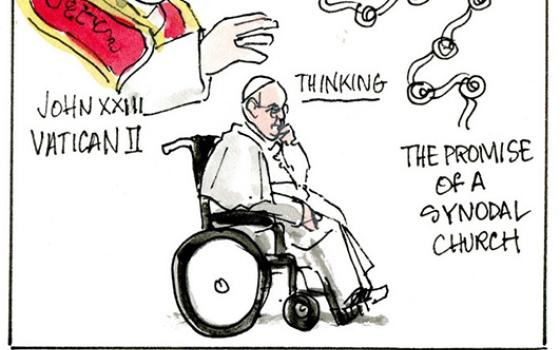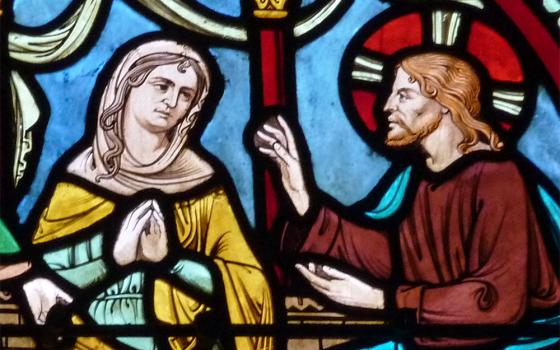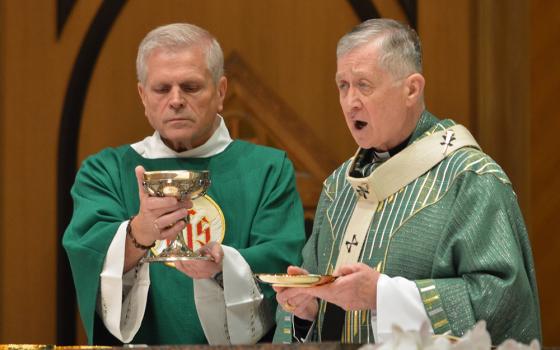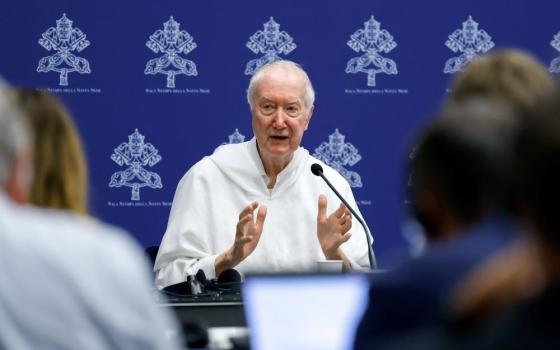Cardinal Joseph Tobin of Newark, New Jersey, listens to Sr. Liliana Franco Echeverri, a member of the Company of Mary and president of the Latin American Confederation of Religious, as she speaks during a briefing about the assembly of the Synod of Bishops at the Vatican Oct. 10. (CNS/Lola Gomez)
Finding better ways to live "like Jesus did" — reaching out, welcoming, healing and including others — was the focus of Sr. Liliana Franco Echeverri's small group discussions Oct. 9-10 at the assembly of the Synod of Bishops, she said.
Franco, a member of the Company of Mary and president of the Confederation of Latin American and Caribbean Religious, or CLAR, and Cardinal Joseph Tobin of Newark, New Jersey, briefed reporters Oct. 10 about the synod's work on various aspects of the theme "communion."
Franco's group discussed how "the service of charity and commitment to justice and care for our common home nourish communion," while Tobin's group focused on welcoming and accompanying people who feel excluded from the church. Under the theme of communion with God and with one another, in the church and in the world, other groups looked at ecumenism, at valuing the cultural, linguistic and racial diversity of the church and at interreligious dialogue.
"There truly is a desire to be able to live like Jesus did, a Jesus who humanizes, who gives dignity, who includes, a Jesus who opens the doors for 'the other,' " Franco said. Living like Jesus calls the church to be "prophetic" in denouncing injustice and exploitation that attacks human dignity and excludes from society people such as the poor, migrants and victims of human trafficking, she said.
Given the synod's rule that conversations and speeches are confidential, Tobin was less specific about the discussion in his small group.
As a superior general and then as a bishop, the cardinal said he had attended six previous synods, and this is "the most diverse synod I've ever participated in." At the same time, he said, many of the questions, concerns and hopes expressed by Catholics in different countries and regions of the world are remarkably similar.
"We're talking about things we heard in our own dioceses," he said. "That's what the church does; it listens."
"We believe in a God who became flesh and blood, like the rest of us, who didn't stay in some celestial isolation," he said. "So, the church always has to be concerned with flesh and blood issues."
Advertisement
The questions Tobin's group was asked to reflect on included welcoming the excluded while proclaiming "the fullness of the Gospel truth."
The question of outreach to those who feel "they are not at home in the Catholic Church," including members of the LGBTQ community, was raised repeatedly in the Archdiocese of Newark's listening sessions and was present in so many reports to the synod that it was included in the assembly's working document, he said.
The archdiocese, he said, has "arguably the most beautiful cathedral in North America and it's five feet longer than St. Patrick's in New York," but — quoting one of his auxiliary bishops — "it's most beautiful when the doors are open."
"And so, I think the real beauty of our Catholic Church is clear when the doors are open and welcoming," he said. "And it is my hope that the synod will help us to do that in an even more significant way."
Franco said members of the assembly have their "feet on the ground," looking honestly at the reality of "a world in which there is xenophobia, exclusive nationalism, leaders who are committed to building borders."
"And in a world like this, our world, the option of the church is the option for fraternity, it is the option for synodality, it is the commitment to understanding that we are all brothers and sisters," she said. "And in a world and in a church where we see each other as brothers and sisters, there is room for everyone."
When asked, both Tobin and Franco insisted synod members were free to speak their minds and that the concerns listed in the synod working document were those that came from listening sessions at the parish, diocesan, national and continental levels.
The reports of each small group for each section of the synod assembly will be handed in to a committee charged with writing a synthesis; synod members will have an opportunity to amend it and to vote on whether it reflects their discussions.
In the end, which is after the second assembly in October 2024, Tobin noted, Pope Francis will determine what and how to enact the synod's conclusions.
"Before I left the diocese, somebody asked me a question about discernment," the cardinal said. "And I said, well, you can decline the verb 'to discern' this way in the context of the synod: I discern. You discern. He decides."







